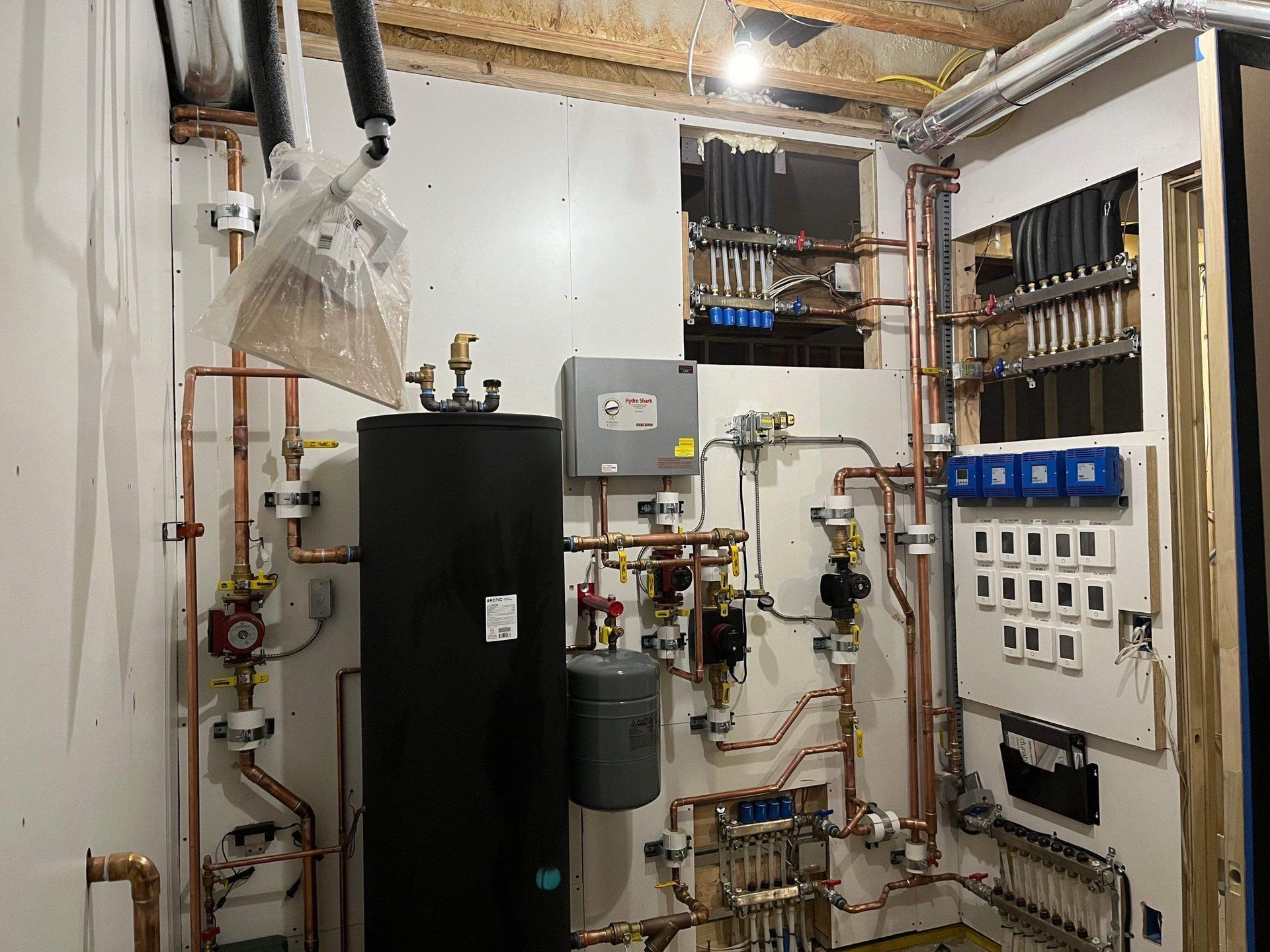Why Hydronics?
What hydronic heating is and why it feels better
Hydronic heating uses water to move heat quietly and evenly through your home. Warm water circulates through tubing in floors or wall-mounted emitters, then returns to a high-efficiency boiler or heat pump to repeat the cycle. With no blower noise or dust movement, rooms stay consistent and comfortable, which suits open plans, high ceilings, and allergy-sensitive households across Denver, Boulder, and Colorado Springs.
Even Temperatures, Quiet Rooms, Cleaner Air

Comfort
Hydronic systems deliver warmth that feels natural and even. Surfaces stay comfortably warm, eliminating drafts and temperature swings common with forced air. The result is balanced comfort that feels steady, calm, and consistent throughout your home.
Design Flexibility
Modern hydronic technology offers virtually unlimited flexibility to match a building’s comfort needs, layout, and design goals. A wide range of heat sources and emitters can be combined within one system, from radiant floors to fan coils and panel radiators. Multi-load designs reduce installation costs by sharing components instead of duplicating them, creating efficient comfort solutions tailored to every home and budget.
Quiet Operation
With no fans or blowers, hydronic systems operate almost silently. Pumps and valves work quietly in the background while warmth radiates through floors or panels. The result is steady comfort without the hum or rush of moving air.
Energy Savings
Hydronic systems use water’s superior ability to transfer heat, allowing them to run at lower temperatures while maintaining comfort. Zoning divides the home into areas that heat only when needed, and outdoor reset control adjusts water temperature automatically with the weather. Because no air is forced through ducts, the building stays better sealed, reducing energy loss and keeping comfort consistent through every season.
Clean Operation
Hydronic heating doesn’t rely on air movement, so it stirs up less dust, allergens, and particles. Homes stay cleaner and air feels fresher, a noticeable benefit for allergy- and asthma-sensitive occupants. With fewer filters and no ductwork, maintenance stays simple.
Seamless Integration
Hydronic systems integrate neatly into existing construction with minimal disruption. Under-joist plates and low-profile tubing assemblies fit tight spaces without altering finished floors. Even in remodels, installation is clean, quiet, and respectful of your home.
Sustainability
Hydronic heating uses water’s natural efficiency to deliver comfort with less energy. Systems pair easily with high-efficiency boilers or all-electric heat pumps, helping homes reduce emissions without sacrificing performance. It’s a long-term, low-impact approach to comfort that aligns with Colorado’s push toward energy-smart living.
Invest in comfort that lasts
Hydronic systems are an investment that pays back in comfort, energy performance, and design flexibility. Floors stay warm, rooms stay calm, and visible hardware disappears which supports high end interiors.
Common Questions About Hydronics
Hydronic systems work differently from forced air, but the results speak for themselves. Rooms stay quiet, temperatures stay steady, and efficiency lasts for years. Below are answers to the most frequent questions we hear from homeowners who want to understand how water-based heating delivers comfort, performance, and long-term value.
Why does hydronic heat feel different from forced air?
Hydronic systems warm surfaces and people directly instead of moving air, so rooms stay even and quiet without drafts or noise. The comfort feels steady and natural, not on-off or forced.
Are hydronic systems energy efficient?
Yes. Water transfers heat more efficiently than air, and advanced controls like zoning and outdoor reset adjust output automatically to reduce energy use while keeping comfort consistent.
Is hydronic heating only for high-end homes?
Not at all. Modern hydronic technology scales to almost any home or budget, offering a wide range of boilers, heat pumps, and emitters to match your space and goals.
How long do hydronic systems last?
Hydronic equipment operates with minimal stress and few moving parts, so with proper design and annual service, systems deliver reliable comfort for decades.
Are hydronic systems environmentally friendly?
They can be. Hydronic systems use water’s efficiency to reduce fuel demand and can pair with electric heat pumps or renewable sources for low-carbon comfort.
What’s involved in caring for a hydronic system?
Annual inspection and performance testing keep the system safe, efficient, and ready for each heating season.
